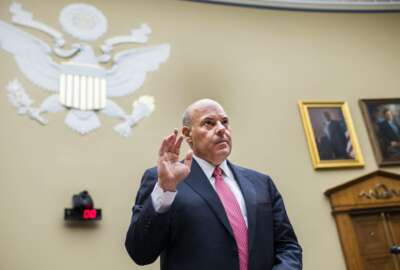To listen to the Federal Newscast on your phone or mobile device, subscribe in PodcastOne or Apple Podcasts. The best listening experience on desktop can be found using Chrome, Firefox or Safari.
- The Pentagon’s inspector general is opening an investigation into whether DoD misspent coronavirus relief funds. The IG plans to begin the probe this month, looking into whether DoD’s CARES Act spending complied with the law. Some members of Congress have contended the department misappropriated parts of a billion dollar fund that they intended for medical supplies and personal protective equipment. The Pentagon has acknowledged it used some of the money to support vulnerable portions of the Defense industrial base, but said the CARES Act explicitly allowed that.
- House Democrats are making their own push to make the president’s payroll tax deferral optional for federal employees. Virginia Reps. Gerry Connolly (D-Va.) and Don Beyer (D-Va.) introduced a House companion to the Preventing Employees from Surprise Taxes Act. Sen. Chris Van Hollen (D-Md.) is the author of the original Senate bill. His legislation now has bipartisan support with Maine Republican Susan Collins (R-Maine). The bill would simply require federal employees to request in writing to participate in the president’s payroll tax deferral policy.
- Four Democratic Committee Chairs want Justice Department Inspector General Michael Horowitz to investigate actions of David Freed, a U.S. District Attorney in Pennsylvania, when he made public statements regarding issues with a small number of military ballots in the state. These statements were then mentioned by President Trump, and now the representatives are worried that by revealing too much about the investigation, Freed may be influencing the 2020 election. (House Oversight and Reform Committees)
- The Defense Department wasted billions of dollars over two years in Afghanistan War reconstruction money. The Pentagon could have bought three major sports teams with the money that it wasted from the beginning of 2018 to the end of 2019, and still had some left over. The $3.4 billion was supposed to go to projects like training and public safety, according to the inspector general overseeing the Afghanistan reconstruction. Instead, that money bought books that were not in readable condition, funded failed counter-narcotics programs and paid for a more than five million dollar border patrol facility that was never used. Since 2002, the U.S. has spent $134 billion on the Afghanistan reconstruction. The inspector general found about $19 billion of that was squandered due to waste, fraud or abuse.
- House Republicans now are looking for more answers from the Department of Veterans Affairs about a recently announced data breach. They commended VA for taking the breached application offline and notifying potentially impacted veterans. But Government Operations Subcommittee Ranking Member Jody Hice (R-Ga.) says the breach isn’t unique to VA applications. He pointed to a recent inspector general report. The IG found some veterans had personal information left unprotected on shared network drives. Representatives at some veterans service organizations had access to this information but didn’t need to.
- The Trump administration is instructing agencies to flag and remove outdated regulations using artificial intelligence. The Office of Management and Budget is directing the General Services Administration to help set up the contract vehicles and AI tools agencies will need to streamline these regulatory reviews. The Department of Health and Human Services ran an AI-led review of its regulations last year, and found nearly 300 outdated requirements. HHS also found 85% of its regulations created before 1990 haven’t been updated since.
- The General Services Administration is taking the pulse of the small business community in preparation for the new governmentwide acquisition contract called Polaris. GSA released a 17 question survey as a request for information. Among the topics GSA wants to hear from small firms on are levels of experience across seven IT services including cloud, cyber and systems engineering. GSA also wants to know how much experience companies have in deploying and developing emerging technologies like artificial intelligence. Responses to the survey are due October 30th.
- There are still too many unanswered questions for industry about the cybersecurity maturity model certification or CMMC program. Industry experts continue to raise serious concerns about the way forward for the Defense Department’s cybersecurity maturity model certification or CMMC program. A technology industry representative told reporters yesterday that the interim rule DoD published in September didn’t offer enough clarity about the certification process, costs and reciprocity. The official says DoD intends to get to reciprocity with other standards, maybe even the cloud security program known as FedRAMP, but details remain sparse. The source also says the Pentagon needs to establish formal communication channels to stop any confusion created by the current use of informal ones like LinkedIn. (Federal News Network)
- The Labor Department is trying to clear up what diversity and inclusion training can continue under the president’s recent executive order. Federal contractors can still host unconscious bias training. But there’s an exception. “Any sort of training that focuses on a particular race or sex for negative treatment, no matter what that race or sex is, that’s where it could be problematic, ” said Craig Leen, the head of Labor’s Federal Contract Compliance Programs. “So for example, training on white fragility or training on white privilege is likely to be problematic.” Labor will give contractors a chance to comment publicly on the EO later this week. (Federal News Network)
- The first batch of enlisted Space Force recruits will ship out to Joint Base San Antonio for training this week. Only seven service members will participate in the training. Those troops will be the first enlisted members of the Space Force, except for the military branch’s Senior Enlisted Adviser, Chief Master Sergeant Roger Towberman. The Space Force plans to bring in more than 300 enlisted recruits next year and then 300 to 500 new recruits a year after that.
- Announced back in January, the Homeland Security Department has launched its new center for countering human trafficking. In his kickoff remarks, acting DHS Secretary Chad Wolf said the new center draws in people from sixteen department components. But it’s led by Customs and Immigration Enforcement’s Homeland Security Investigations. He said the center would be a hub for victim support, investigations, data analysis, and outreach to other law enforcement operations. Wolf emphasized that human trafficking often occurs entirely with the United States. HSI Criminal Investigator Angie Salazar will direct the center.
- A watchdog report finds operational changes at the Postal Service had a significant impact on mail delays. The Postal Service inspector general says the agency met legal requirements when it implemented operational changes, but took issue with its execution. The IG found USPS didn’t complete a study or analysis of the impact these changes would have on mail service, even though some regions were short-staffed with sick leave taken during the COVID-19 pandemic. The IG also notes USPS implemented these changes with little documentation or written guidance, and that instructions were handed down verbally, leading to confusion and inconsistent execution. (Federal News Network)
Copyright
© 2024 Federal News Network. All rights reserved. This website is not intended for users located within the European Economic Area.




